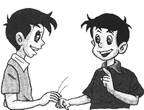题目内容
Mr. Smith was an old miser (守财奴). He had a lot of 16 , but he never bought anything 17 . He and his wife lived in an old house outside the town. He often went to the shop 18 in order to save some money. In the 19 , as soon as it was dark in the room, he 20 . He had no TV but bought a cheap radio and often 21 the advertisements.
The old man had no 22 , his wife was often ill. He wouldn’t send her to the hospital. He thought he would 23 much to the doctors if they looked her over. He bought a few medical books and bought some 24 for her.
One night, Mrs. Smith felt unwell. She had got a bad headache. She asked her husband to 25 a doctor, but he didn’t agree. He brought out some pills and made her 26 them. But it was no use.
The old woman began to 27 at home. Mr. Smith locked the door and went in another room and 28 there. The next morning, when he woke up, he came into her 29 to see if she was all right. But he found the poor woman had died. He hurried to the telephone, but 30 his mind at once. He ran out and shouted to the servant (佣人), “Don’t cook breakfast for Mrs. Smith this morning, Linda!”
The old man had no 22 , his wife was often ill. He wouldn’t send her to the hospital. He thought he would 23 much to the doctors if they looked her over. He bought a few medical books and bought some 24 for her.
One night, Mrs. Smith felt unwell. She had got a bad headache. She asked her husband to 25 a doctor, but he didn’t agree. He brought out some pills and made her 26 them. But it was no use.
The old woman began to 27 at home. Mr. Smith locked the door and went in another room and 28 there. The next morning, when he woke up, he came into her 29 to see if she was all right. But he found the poor woman had died. He hurried to the telephone, but 30 his mind at once. He ran out and shouted to the servant (佣人), “Don’t cook breakfast for Mrs. Smith this morning, Linda!”
| 小题1: |
|
| 小题2: |
|
| 小题3: |
|
| 小题4: |
|
| 小题5: |
|
| 小题6: |
|
| 小题7: |
|
| 小题8: |
|
| 小题9: |
|
| 小题10: |
|
| 小题11: |
|
| 小题12: |
|
| 小题13: |
|
| 小题14: |
|
| 小题15: |
|
小题1:D
小题1:C
小题1:A
小题1:B
小题1:D
小题1:A
小题1:D
小题1:C
小题1:B
小题1:D
小题1:A
小题1:C
小题1:A
小题1:B
小题1:C
这是考查综合能力的题目,做这种题时,首先浏览一下全文,然后试着去填,一定要瞻前顾后,把握好语言环境,切忌盲目,最后,再通读全文检查。16.可根据Mr. Smith was an old miser (守财奴).做出正确判断。17.根据语言环境“但是他从不买贵重的东西”。18.根据in order to save some money.做出正确选择。19.此题学生容易出错,afternoon指得是12点至傍晚6点,符合语言环境。night反倒不符合语言环境。20. D. went to bed符合语言环境。21.根据 He had no TV but bought a cheap radio选择listened to才能搭配。22.根据下文可做出正确判断。23.这句的含义是“如果医生为他检查的话,他就会付很多钱。”24.根据 He bought a few medical books and他买的是同一类,可做出正确判断。25. D. send for的含义是“派人去请”符合文意。26.根据句型 make sb do sth 可做出正确判断。27. C. cry 符合语言环境。28.可根据 The next morning, when he woke up选择 A. slept。29. B. bedroom符合语言环境。30.选 C. changed “改变主意”符合语言环境。

练习册系列答案
相关题目
